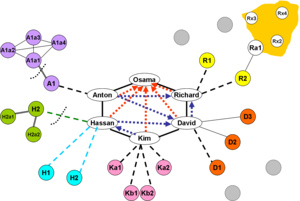 Image via Wikipedia
Image via WikipediaIn situations/ encounters where one group (tribe, nation, gang, army, corporation, aliens from another stellar system) comes to meet (or, more aptly, confront) another previously unknown group, the first inclination (strictly a function of Human Nature) is for both groups to be distrustful and suspicious of each other, and to seek some form of safe settlement or stability to minimize the fear and maximize the sensation of security. This sense of security may be temporary or longer-term, and it may be well-founded or very illusory. But it is always a destination point -- especially where resources or territory are limited or otherwise at issue. Either the groups will reach a productive accord, or one will ultimately prevail and dominate.
A cautious trial-and-error ritual is called for in every one of these cases. It is a ritual that leads to positioning and settlement of one sort or another. If a symbiosis or synergy is not rapidly found, acknowledged, valued and put into operation between the two sides, there will be a conflict where both sides will sustain losses, but one will emerge the victor-of-record. By crude analogy, the ceremonial dance will either result in a mating or a massacre.
In these situations, each of the parties will absolutely choose one of the following four fundamental settlement strategies. Being badly in need of ego gratification, I refer to these as Douglas E. Castle's Four Fundamental Settlement Options:
OPTION 1: Diplomacy. Finding complementarity. Becoming valuable to each other as allies.
OPTION 2: Avoidance. At its worst, this becomes appeasement.
OPTION 3: Warfare. Whether covert or overt, it is reliant upon the elements, as discussed in short order, of surprise and overwhelming force. Sometimes it is done in a repeated 'hit-and-run' fashion, and sometimes it is done with
OPTION 4: Espionage and Applied Intelligence. This requires great technological and social engineering skills. The objective is either to a) be gone when the enemy strike takes place, causing the attacker to waste tremendous resources, and to be in the wrong place at the wrong time, or b) to attack the enemy at its weakest point in terms of resources, preparedness and time. Both a and b work hand-in-hand in an optimal OPTION 4 Scenario.
My first choice is OPTION 1. When the possibilities and the prospects do not seem good, my immediate second choice is OPTION 4. Sadly, OPTION 2 leads to enslavement, and OPTION 3 is one of the most profitable industries in the world for too many powerful parties who stand to benefit by prolonged and inefficient conflicts...behavioral psychology coldly and meticulously exploited in the name of avarice.
In law enforcement and many rudimentary military operations, the conventional (and short-order) wisdom is that in order to overwhelm a target,presumably an enemy, you must have two elements on your side: 1) Complete Surprise; and 2) Overwhelming Force.
These are indeed critical components in overpowering and conquering an enemy. They also require a tremendous investment in ordnance, personnel, logistics and communications, as well as the ability to keep a secret by using tight need-to-know informational controls, impenetrable communications systems and zero leakage.
Many very otherwise under equipped forces (terrorist cells, insurgent groups, organized 'underground' movements) fraction their information into compartmentalized 'cells' so that no one individual has complete knowledge of the plan of attack. In larger, more powerful forces, this fine point of splitting up information into little puzzle pieces (so that no traitor or captured party can divulge any significant part of the plan -- willfully or under extreme duress*) is not taken very seriously. When budgetary resources are plentiful, and a profit can be derived from a protracted and primitive conflict -- OPTION 4 is underutilized (and often underdeveloped) and overshadowed by the dubious promise of OPTION 3.
Any student of history knows this. In fact, just watch some late night television shows and see how many well-planned strikes, or "busts" fail because the targeted location was either abandoned by the adversary due to some illicit advance notice of the pending strike. In fact, to compound matters and make things worse, these heavily-armed, resource-laden strike teams are often led right into an ambush or trap, creating a double victory for the would-be victims.
*With reference to the photo at the top of this article, it is a simplified structural diagram, courtesy of Wikipedia, of the Core, infrastructure, operational groups, support net from al-Qaeda style cell system.
The most efficient option [of those possible in accord with D.E. Castle's Four Fundamental Settlement Options] is the one which uses the minimal resources to the maximum advantage. OPTION 1 is my preference because of its inherent potential for prosperity and peace. My second choice, when in serious doubt, is OPTION 4.
Knowledge, if properly acted upon, is indeed power; and brute force is as expensive as it is ineffective when lined up against well-implemented espionage derived of reliable intelligence analyzed and acted upon decisively.
In terms of a leadership or command decision, this OPTION 1 to OPTION 4 move is not indicative of cowardliness by any means. It is a matter of pragmatism in terms of conserving resources and maximizing the chance of either alliance or victory, as appropriate in the circumstances.
Douglas E. Castle [http://TheInternationalistPage.blogspot.com]
Tweet



No comments:
Post a Comment